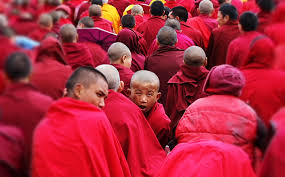Buddhists have a non-attitude towards other religions, they recognise, unlike most of the dominant religions in the world today, that there are many overlapping paths to the same goal. If you start from the knowledge that Buddhism is not actually a religion itself, and by looking deeper into Buddhist beliefs and practises, then their non-attitude towards other religions begins to become clear and understandable.
Tibetan Buddhism

The main schools of Buddhism in particular Tibetan Buddhism mostly name their conglomerate of philosophies and systems as a, Spiritual Tradition. There is no veneration or recognition of a single all powerful Divine Being or Creator. It is in fact the opposite, Buddhism seeks to reveal through specific mind, speech and body systematic practices; the true state of all beings as wholly responsible for the creation of their own realities.
Acceptance to All Religions
In practice what this means is that Buddhism accepts all religions, all faiths, and all spiritual practices regardless. The goal of Buddhism is for the individual to understand the true nature of the mind and universe we live in, and by doing so come to a complete realisation of that understanding, this is called enlightenment. Key to this is the individual, not the family, group, faith or society to which that person belongs to or believes in. Buddhism is focused on individual understanding rather than a communal one. In line with this Buddhism does not seek to recruit people to align them with their way of thinking. There are no Buddhist missionaries out and about trying to swell their ranks or convert people to their ways.
Buddhism does not in any way enforce their way as the only way; it is a fluid set of systems that allows for individual differences of belief and opinion. Paramount to Buddhism is the belief and practice of, No Harm to yourself or other’s; as a result there has never been a battle, war or crusade fought in the name of Buddhism, ever.
How to become a Buddhist?

To become a Buddhist you must go to them, and this is in line with Buddha’s teachings that; we all walk our eternal paths alone; no one can save you but yourself. Combined with a complete tolerance that is inherent in his teachings, meaning you can worship whomever you want to in addition to being a Buddhist. During his lifetime Buddha actually opposed any images or sculptures being made or venerated that portrayed his personage. He was also proponent of a non-hierarchical spiritual Sangha or school, in which all were equal and those who had gained an understanding and realization would teach that understanding to others within the Sangha.
Because of Buddhism’s fluidity as it spread throughout the world it encompassed many local beliefs and mythologies, but unlike the Catholic Church, it never claimed them, nor changed them into Buddhist only doctrine when it did so. As a result, especially in Tibetan Buddhism, there are whole pantheons of local mythologies that have been perfectly preserved within their original templates. It was customary for Buddhist monks to translate Buddha’s teaching into their most understandable form specific to local regions. In so doing the local people would gain a better understanding of Buddhism from within their established traditional mythologies and systems of belief. Utmost respect was given to these beliefs and they were never denigrated, disregarded or discarded, as being inferior to Buddhism. In Tibetan Buddhism this can be evidenced by the Bodhisattvas; Chenrezi and the Green, White and Red Tara’s.
If you combine all these elements of Buddhism you can clearly see and understand the Buddhist non-attitude toward all religions. Personally I see Buddhism as a set of self awareness sciences that range from medicine and health practices to psychological techniques and that plain old powerhouse, compassion. I have meditated alongside people of all religions from Muslim, Christian, Hindu, Wicca, Jewish and Sikh, and they too understood that Buddhism was not a religion and it did not interfere with their beliefs in any way. For me this was a direct experience of the Buddhist non-attitude towards other religions.





